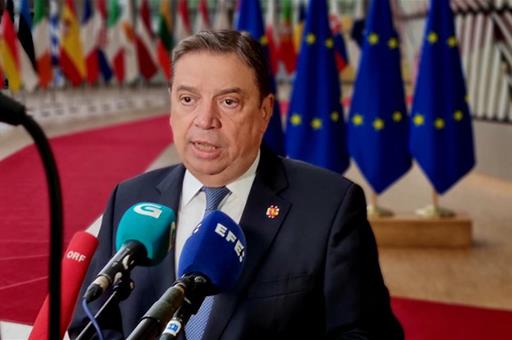At the EU Agriculture and Fisheries Council of Ministers in Brussels
Luis Planas asks the European Commission to suspend and review the ban on deep sea fishing
News - 2022.9.26
The Minister for Agriculture, Fisheries and Food, Luis Planas, has urged the European Commission (EC) to suspend the application of the implementing regulation on marine protected areas, which prohibits fishing in 87 deep-sea areas on the continental shelf, and to immediately revise it on the basis of new scientific data that are already available.
He stated that, should the Commission not accede to the request made by Spain and supported in the public session by several Member States, such as France, Ireland, Portugal, Denmark, Greece and the Netherlands, "we will take the measures we consider appropriate", without ruling out the submission of an appeal to the Court of Justice for the European Union, as there is a basis for doing so.
At the Council of Agriculture and Fisheries Ministers for the European Union (EU), which is being held today in Brussels, Planas stressed that, "Europe is at war", and that the agri-food sector, including the fisheries sector, "is one of the pillars of our resistance". For this reason, the Minister does not understand the Commission's decision to push ahead so quickly with this regulation, which seriously affects the interests of the Community fisheries sector.
He assured that Spain is in favour of protecting those vulnerable marine ecosystems that, on the basis of scientific studies, should be protected. However, it has expressed its disagreement with the Community regulation because, in both form and substance, it contains, "serious errors that make it clearly harmful to the fishing interests of the Spanish fleet".
As for the form, the Minister considers that the consultation with the sector and the countries concerned was insufficient, as only one meeting was held at which the opinion of the Advisory Council was not adopted, due to a lack of majority.
In terms of the substance, Spain considers that the regulation does not reflect the best available scientific information. Thus, in relation to fishing zones, the Commission's measure is much more far-reaching than the International Council for the Exploration of the Sea (ICES) report indicates. As for the practices that are banned, such as bottom longlining or using gillnets, the Minister pointed out that these have not been considered in any way in the ICES report.
He also criticised the lack of a sufficiently thorough and decisive study on the economic and social consequences of this measure for the fisheries sector. Spain is in favour of the precautionary principle from an environmental point of view, but, "we will also have to have a precautionary principle with regard to fishing activity", he added.
On the other hand, Planas has appealed to the EC to firmly defend Community fishing interests in order to achieve ample and sufficient fishing opportunities that guarantee the profitability of the fleet in the negotiations that must be held with the United Kingdom on shared waters before the end of the year. The waters shared with the UK are of particular interest to Spain, which catches northern hake, redfish, anglerfish and Norway lobster. The decisions taken for cod in this area are also very sensitive for Spain because of the strangling effect they could have on the Spanish fleet.
The Minister also advocated that the Community fleet should not lose fishing opportunities in its share-out with Norway, in whose waters Spain claims to maintain its current cod and redfish quota in full. "We believe it is necessary for the European Commission to maintain a firm stance and thus achieve a good result", he stressed.
Non official translation





